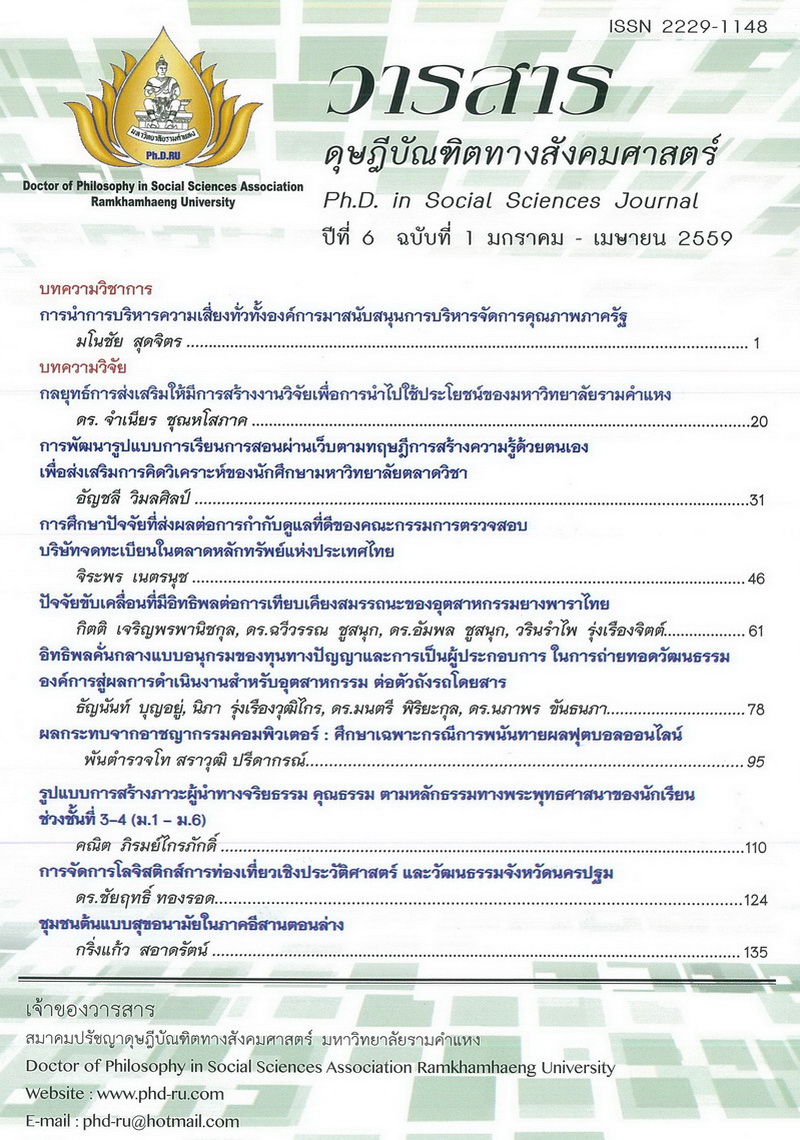รูปแบบการสร้างภาวะผู้นำทางจริยธรรม คุณธรรม ตามหลักธรรมทางพระพุทธศาสนาของนักเรียนช่วงชั้นที่ 3-4 (ม.1 - ม. 6)
Main Article Content
Abstract
ผลการวิจัย พบว่า
1. องค์ความรู้เกี่ยวกับการสร้างภาวะผู้นำทางจริยธรรม คุณธรรม ตามหลักธรรมทางพระพุทธ ศาสนาของนักเรียนช่วงชั้นที่ 3-4 (ม.1-ม.6) โดยใช้กระบวนการเดลฟาย (Delphi) จากผู้เชี่ยวชาญ จำนวน 6 คน ได้หมวดธรรมทางพุทธศาสนาที่เหมาะสมเกี่ยวกับการสร้างภาวะผู้นำทางจริยธรรม คุณธรรมของ นักเรียนช่วงชั้นที่ 3-4 (ม.1-ม.6) จำนวน 9 หมวดธรรม แบ่งเป็นหมวดธรรมทางจริยธรรม 5 หมวดธรรม 22 ข้อธรรม และหมวดธรรมทางคุณธรรม 4 หมวดธรรม 20 ข้อธรรม รวม 42 ข้อธรรม
2. รูปแบบการฝึกอบรมการสร้างภาวะผู้นำทางจริยธรรม คุณธรรม ตามหลักธรรม ทางพระพุทธ ศาสนาของนักเรียนช่วงชั้นที่ 3-4 (ม.1-ม.6) ผ่านการตรวจสอบและประเมินคุณภาพโดยผู้เชี่ยวชาญทั้ง 6 คน ปรับปรุงแก้ไขตามคำแนะนำ ผลการทดลองใช้กับนักเรียนกลุ่มทดลองใน 3 โรงเรียน พบว่า มีประสิทธิภาพ 86.67/81.56 สูงกว่าเกณฑ์ที่กำหนด 80/80 ผลสัมฤทธิ์ของการพัฒนาด้านความรู้และทักษะปฏิบัติทาง จริยธรรม คุณธรรม ตามหลักธรรมทางพระพุทธศาสนา รวม 9 หมวด 42 ข้อธรรม ของนักเรียนกลุ่มทดลอง ก่อนและหลังการทดลองใช้รูปแบบ แตกต่างกันอย่างมีนัยสำคัญทางสถิติที่ระดับ 0.01 และมีความพึงพอใจ ต่อการใช้รูปแบบ อยู่ในระดับมาก ซึ่งสูงกว่าเกณฑ์ที่กำหนด
3. หาค่าความเหมาะสมของรูปแบบการสร้างภาวะผู้นำทางจริยธรรม คุณธรรมตามหลักธรรมทาง พระพุทธศาสนาของนักเรียนช่วงชั้นที่ 3-4 (ม. 1 - ม. 6) โดยการเปรียบเทียบผลสัมฤทธิ์ของการพัฒนาด้าน ความรู้และทักษะปฏิบัติทางจริยธรรม คุณธรรม ตามหลักธรรมทางพระพุทธศาสนา รวม 9 หมวด 42 ข้อ ธรรม ของนักเรียนกลุ่มควบคุมใน 12 โรงเรียน ก่อนและหลังการใช้รูปแบบการสร้างภาวะผู้นำทางจริยธรรม คุณธรรมตามหลักธรรมทางพระพุทธศาสนา มีผลไม่แตกต่างกันกับผลในกลุ่มทดลอง
THE CONSTRUCTION OF AN ETHICAL AND MORAL LEADERSHIP MODEL USING BUDDHIST PRINCIPLES
This reaearch, has following purposes. (1) The study on the ethical, moral principles of Buddhism (2) Create atraining programfor leadershipandethics, the moral of the students of the third level education, Bangkok Region 1-3 (3) Leadership trainingand pretest of moral leadership, the moral of the students of the third level education. Summarized form oftraining, ethicalleadership, the moral of the students of the third level education, Bangkok Region 1-3,
The result found that:
1. Form of moral leadership, moral principles of Buddhism all 9 chapters 42 articles has to be done in three steps, a) Basic Level, the course provides students with the basic ethical principles of Buddhism. b) Practice Level, is to apply knowledge of the training in some circumstances with regard to the ethical reasoning. C) Enlightenment Level is to bring the knowledge and practice into real situations. This method of training and practice has effective implementation as high as 86.67 / 81.56 which is higher than the set criteria of 80/80.
2. Achievement of the development of knowledge and practical skills, ethical, moral principles of Buddhism all 9 Chapters with 42 Articles of the students of the third level education, Wad Borwornnivade School, Srigun School (Wattananun Ooppatham), Taweewattana School, Office of Education, District 1-3, before and after the experiment using a model of leadership, ethical, moral and religious principles, by means of training and practice. Differences are statistically significant at the 0.01.
3. Students of the third level education,Wad Borwornnivade School, Srigun School (Wattananun Ooppatham),Taweewattana School, Office of Education, District 1-3are satisfied withthebuilding of leadership, ethicaland moral principles of Buddhism all 9 chapters 42 articles by means oftrainingand practice. School Administrators, Principles, Teachers who participating in the project, Head Teacher of student development activities and the students participated are satisfied with the form of moral leadership and the moral principles of Buddhism that is higher than the set criteria to illustrate the benefits of training under this program that can modify the behavior of students who attend the training to be good leadership or be a good example for other students that is expected to continue on into the future.
Article Details
Academic articles, research articles, and book reviews in the Ph.D. in Social Sciences Journal are author’s opinions, and not the publisher’s, and is not the responsibility of the Ph.D. in Social Sciences Journal Philosophy Association, Ramkhamhaeng University. (In the case that research is done on human, the researcher has to be trained in Ethics for Doing Research on Human Training and has to produce the evidence of the training).


